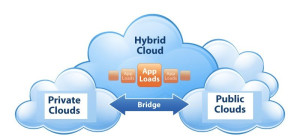 Before making the final decision and choose between VPS and cloud hosting, it is important for you to know the basic differences between these two types of services. Both of them are modern hosting techniques. Although both are helpful in hosting your websites, files, documents, etc…, yet they are very different from each other. If you know the differences between the two, you can make a right decision and choose the best hosting solution for your business.
Before making the final decision and choose between VPS and cloud hosting, it is important for you to know the basic differences between these two types of services. Both of them are modern hosting techniques. Although both are helpful in hosting your websites, files, documents, etc…, yet they are very different from each other. If you know the differences between the two, you can make a right decision and choose the best hosting solution for your business.
Cloud hosting works by storing files and data on the “Cloud” so that they can be accessed worldwide faster and more easily. This allows fastest access to resources according to requirements and demands, with an increased resource availability. With this type of hosting you are no longer confined to a single system. The information is shared across a wide network of servers, the so-called “Cloud network”.
VPS hosting depends on Virtual Private Servers. VPS allows the storage and creation of multiple virtual server accounts on a single computer hardware configuration, sharing resources such as RAM, disk space, CPU, etc… VPS provides the same benefits provided by a dedicated server but at a much lower cost.
The major difference between VPS hosting and cloud hosting is the accessibility. Unlike VPS, cloud hosting allows a more rapid access to website resources from all over the world. In terms of speed, cloud hosting is faster than VPS.
Basic similarities between VPS and Cloud Hosting
Similarities between VPS and Cloud hosting are mainly related to pricing, security levels and billing.
VPS and cloud hosting are quite similar regarding pricing. You only need to pay for the amount of resources you use or the space you rent. With both VPS and cloud, you need to pay a very small amount if you rent a smaller space. This amount increases with the increase in space to be rented.
Both these types ensure that your system remains highly secure. This is one of the major reasons why companies are shifting from shared to VPS and cloud hosting. VPS hosting is a bit better than cloud hosting in matters of security. But still, Cloud is far ahead of Shared as it provides a much secure infrastructure.
Billing of both VPS and cloud hosting is quite similar. With Shared hosting, you are generally associated with the service provider for a year through a contract and you need to pay the bills yearly whereas with VPS and cloud you are not confined to any contract and you need to pay the bills monthly. If you do not find these services good, you can give up following the first month of the billing cycle.
Moreover the monthly billing allows a more easy management of resources as per your requirement. In case you need more resources and space, you are not bound to pay the additional fee for the entire year. Instead, you just need to pay the increased fee starting the month you upgrade your service.
VPS vs. Cloud Hosting: Which one to choose?
If you are interested on which one to choose between VPS and cloud hosting, you can decide considering your requirements.
If you need a fast and global access to documents, videos, data, files, presentations etc…, then cloud hosting is the best choice for you. It allows you to store important data on servers in the “Cloud” making it available to your clients. This increases the availability and accessibility of your data. Moreover, if your employees are constantly on the move, cloud hosting will definitely suit your needs as they can access the data and information from anywhere faster and more easily.
If your requirement is limited to the installation of a software, or to setup s mall websites like an article service, a blog, or a combination of all these, then VPS hosting will best suit your needs. It is generally suitable for those who need more resources for their websites but don’t care on worldwide fast access to content.
Both VPS and cloud hosting have their own advantages and disadvantages. It all depends on you to find out which of them works better for your business.







